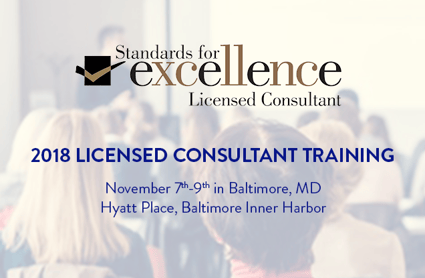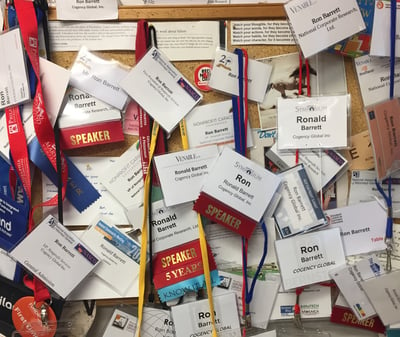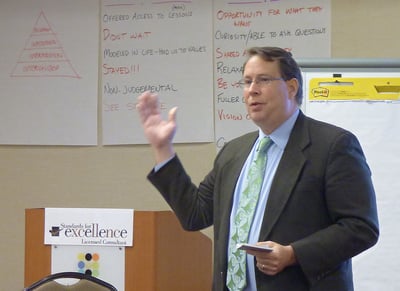 Last November, in partnership with Maryland Nonprofits, COGENCY GLOBAL sponsored the Standards for Excellence® Institute 2018 Licensed Consultant Training Program in Baltimore. The training program brought together a diverse group of fundraisers, consultants, and nonprofit executives for an intensive, three-day training program on nonprofit governance, management, and operations.
Last November, in partnership with Maryland Nonprofits, COGENCY GLOBAL sponsored the Standards for Excellence® Institute 2018 Licensed Consultant Training Program in Baltimore. The training program brought together a diverse group of fundraisers, consultants, and nonprofit executives for an intensive, three-day training program on nonprofit governance, management, and operations.
This year’s class included our very own Ronald J. Barrett, COGENCY GLOBAL’S Vice President of Nonprofit Services. Now that he’s officially licensed, we wanted to hear about his experience and learn more about the program overall.
Q: Ron, what were your top 3 takeaways from the training?
Ron: That’s easy. My top takeaways were the depth and breadth of the instructors’ experience and knowledge, the comprehensive educational resource packages and tools in support of the program, and the caliber of professionals admitted to this year’s class.
One of the newly licensed consultants, Robbie MacCue of Albany, NY, better captures my sentiments:
“As someone who was the President of a nonprofit, I wish that I knew about the Standards for Excellence® Institute sooner. The wisdom and knowledge of so many nonprofit and governance leaders are captured in the Institute's easy-to-understand guiding principles, providing a clear pathway for nonprofits to follow to success. I look forward to bringing the Standards model to as many […] organizations as possible with my new status as a Licensed Consultant.”
Q: How will this experience impact your current work with nonprofits?
Ron: I have a stronger understanding of the challenges nonprofits face to succeed. Though they are not motivated by profit, nonprofits struggle with the same issues as any business and, as organizations with the benefit of tax exemptions, nonprofits are often held to a higher standard of public trust. Though nonprofits face the same challenges of for-profit businesses, sometimes they struggle to gain the experience or knowledge needed to succeed.
Meeting these expectations is a daunting task and a function of good management and governance, along with a commitment to high ethical standards and adherence to best practices across operational channels. The diverse knowledge I acquired in this training helps me better see the ‘big picture’ and see how my work supports nonprofits in meeting some of these challenges.
Q: Based on your experience, who is this professional development best suited for?
 Ron: As the Standards for Excellence® Institute’s website states, “the Licensed Consultant Training is an exclusive professional development initiative that gives independent consultants the knowledge, skills, and tools necessary to work with nonprofit organizations across the country interested in learning about, conducting self-assessments, implementing change, and becoming accredited in the Standards for Excellence® program.”
Ron: As the Standards for Excellence® Institute’s website states, “the Licensed Consultant Training is an exclusive professional development initiative that gives independent consultants the knowledge, skills, and tools necessary to work with nonprofit organizations across the country interested in learning about, conducting self-assessments, implementing change, and becoming accredited in the Standards for Excellence® program.”
Beyond this, I’d say it is not an entry-level training program and is best suited for C-level nonprofit executives (ED/CEO, CFO, COO, etc.), or nonprofit directors and consultants with prior C-level experience. Candidates should come in with a high-level understanding of nonprofit governance, management and operations.
(Editor’s note: Ron saves all his conference badges and shared the above photo of this collection from his office.)
Q: What advantage comes with hiring a licensed consultant, from a nonprofit’s perspective?
Ron: Ultimately, an organization is only as good as its people. I see a licensed consultant as a coach/mentor/cheerleader who assists in the betterment of a nonprofit organization’s people: its directors, managers, employees, and volunteers.
Plus, a licensed consultant offers an outsider’s perspective and can address issues that others within the organization may be too uncomfortable to discuss. Good consultants will push issues that might otherwise be tucked away and not receive needed attention. Diversity, equity, and inclusion, for example, are subjects that many organizations struggle with, as there is often a lack of understanding, knowledge, or comfort to adequately tackle these topics. An independent Standards for Excellence Licensed Consultant, with the necessary training and resources, can better guide an organization – and its people – to success.
Q: If someone were ‘on the fence’ about applying for 2019, what advice would you have for them?
Ron: For nonprofit executives and directors, your organization will benefit greatly if it can commit to follow your lead, especially if that commitment is coupled with the goal of achieving one of the Standards for Excellence® tiered accreditation programs. Accredited organizations are recognized as leaders in the nonprofit space and have greater credibility and enhanced reputation in the community.
Not to overlook the fact that Standards for Excellence® accreditation is increasingly recognized by funders as what I liken to a ‘badge of honor’, ‘seal of good housekeeping’, or as the Standards puts it, ‘An Ethics and Accountability Code for the Nonprofit Sector’.
As a licensed consultant, organizations you work with will be well positioned for successful accreditation. Aside from its people (management, employees and volunteers alike), a nonprofit’s reputation is arguably its greatest asset, and I can think of no better way to establish and maintain a great reputation than taking part in this training.
Q: How do you see this type of licensing and certification changing the nonprofit sector?
Ron: Public trust of nonprofits is of paramount importance to the sector’s success, and unfortunately it is waning. The nonprofit sector is riddled with stories of fraud, abuse and negligence…and even just a handful of ‘bad apple’ situations can stymie the efforts of reputable, well-managed organizations.
Licensed consultants working with nonprofits striving to become accredited by the Standards for Excellence® Institute assist in bridging this gap in public trust. Though there are watchdog organizations, such as GuideStar, Charity Navigator, GiveWell, and the BBB Wise Giving Alliance, none of these organizations, individually or collectively, cover the depth or breadth of issues important to the success of nonprofit organizations.
The preamble of the Standards for Excellence® code summarizes this well:
“…the code builds upon the legal foundations of nonprofit management, governance, and operations to embrace fundamental values such as honesty, integrity, fairness, respect, trust, compassion, responsibility, and transparency. The code consists of six Guiding Principles in 27 topic areas with specific benchmarks that characterize effective, ethical, and accountable organizations.”
Q: COGENCY GLOBAL sponsored this year’s training event in partnership with Maryland Nonprofits and the Standards for Excellence® Institute. What is the motivation behind our supporting an event of this nature?
Ron: Corporate filings, registered agent appointments, state tax exemptions (income and sales), business licensing, and charitable registration and renewal filings can be very time-consuming, distracting tasks. Our nonprofit team takes great pride in meeting the needs of our nonprofit clients, knowing that our knowledge, expertise, and experience helps organizations meet and comply with state and local laws and filing requirements, so they can keep the focus on their mission.
 I see the Standards for Excellence® Licensed Consultant Training Program in a similar light…it helps people who work with nonprofits succeed and grow by improving governance, strengthening management, and motivating operations. I think that COGENCY GLOBAL’s brand is enhanced when we support services and programs that benefit both nonprofits and the nonprofit sector overall.
I see the Standards for Excellence® Licensed Consultant Training Program in a similar light…it helps people who work with nonprofits succeed and grow by improving governance, strengthening management, and motivating operations. I think that COGENCY GLOBAL’s brand is enhanced when we support services and programs that benefit both nonprofits and the nonprofit sector overall.
Plus, the Standards for Excellence® code’s preamble mentions ‘integrity’ and ‘fairness’, two words that are dear to COGENCY GLOBAL. Our CEO, Bruce Jacobi, can never be blamed for not constantly reminding us that we “…are building a successful business with a demonstrated commitment to integrity, fairness and fun”. Sponsoring the Standards for Excellence Licensed Consultant Training Program is one of many ways that we are meeting our mission — and doing so while also assisting nonprofits meet theirs. Sounds like a ‘win–win’ to me.
This article is provided for informational purposes only and should not be considered, or relied upon, as legal advice.

